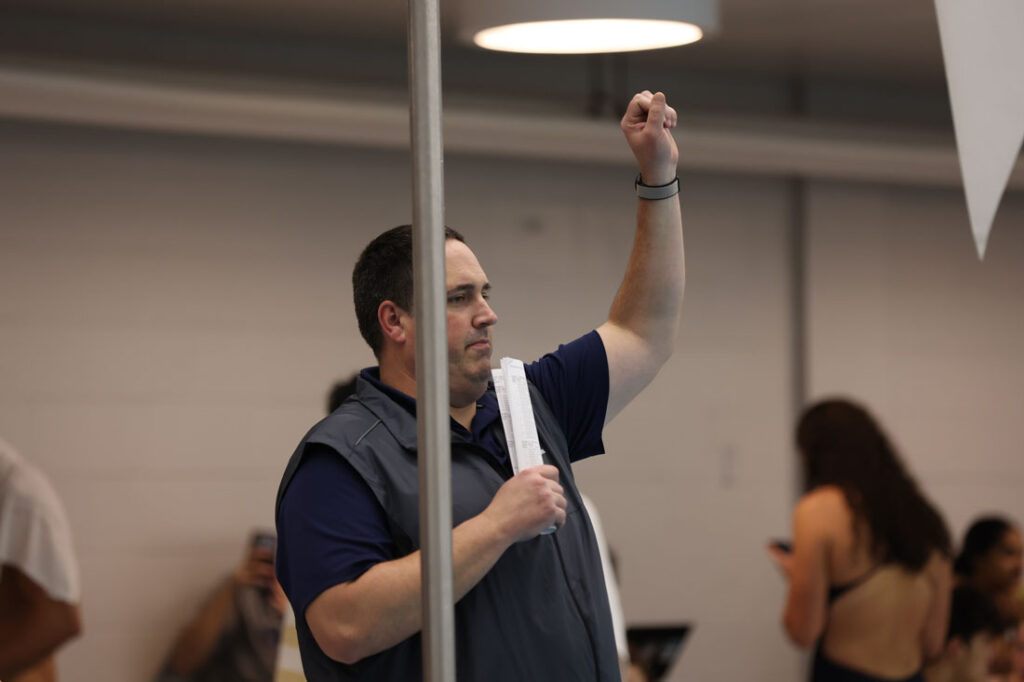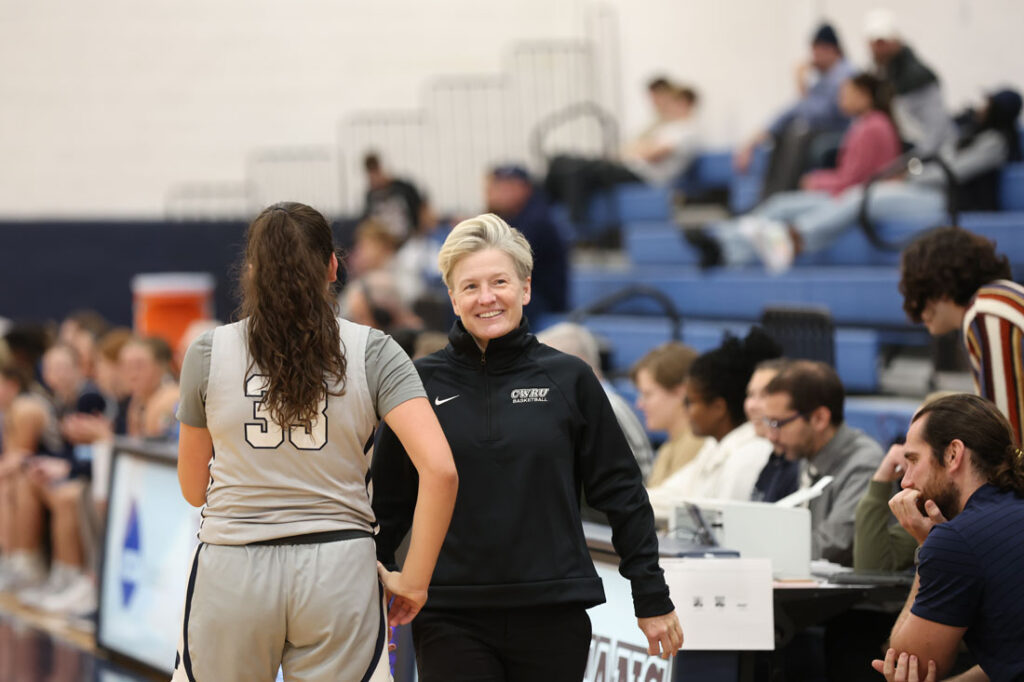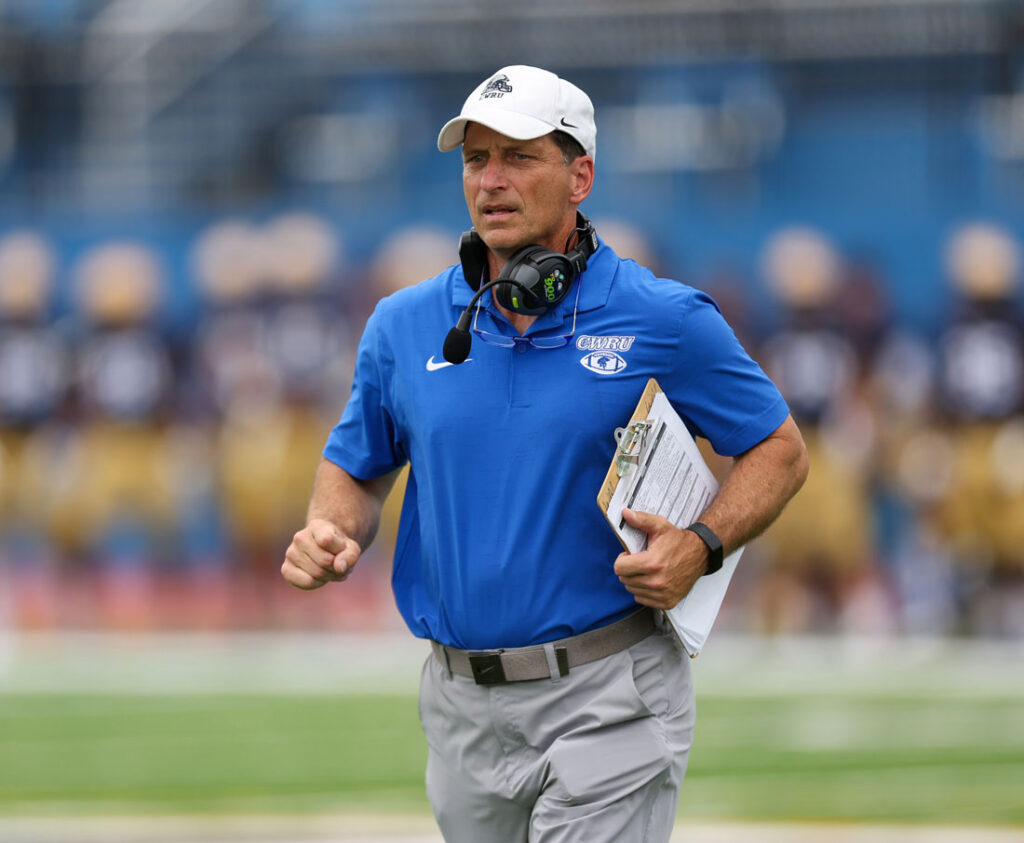Coaching is about more than just calling plays—it’s about inspiring, motivating and helping athletes grow both in their sport and in life. The best coaches don’t just focus on winning; they guide their teams to become stronger individuals while fostering a sense of unity and purpose.
That’s why, in 1972, President Richard Nixon declared Oct. 6 National Coaches Day, a time to celebrate the powerful impact coaches have on their athletes and communities.
To recognize the occasion, The Daily is putting the spotlight on three of the many influential athletic coaches at Case Western Reserve University: Doug Milliken, head swimming and diving coach; Jennifer Reimer, head women’s basketball coach; and Greg Debeljak, head football coach.
Doug Milliken

Doug Milliken’s coaching career began with a twist of fate. As a college swimmer, an injury cut his athletic career short—but instead of stepping away, he found a new role as a student assistant coach: “Now, 24 years later, here I am.”
That unexpected transition sparked a coaching journey that has defined his life ever since.
For Milliken, coaching isn’t just about winning meets—it’s about fostering growth in every athlete, both in and out of the pool. His philosophy centers on building meaningful relationships.
“That’s what helps them achieve their goals—not just in competition, but in life,” he noted.
Milliken places a strong emphasis on integrity, kindness and accountability. He believes in creating a culture where athletes are not just teammates—but also a support system for one another.
“I strive to model those values,” he said, “but I also encourage the team to hold each other accountable.”
While Milliken has experienced significant competitive success, those moments don’t hold as much weight as the relationships he’s forged along the way. His proudest memories include receiving texts about former athletes landing new jobs or getting wedding invitations in the mail—to him, those milestones mean more than any medal.
Navigating challenges, such as coaching during the pandemic, has only strengthened those bonds. Through the ups and downs, Milliken has adapted and learned from both his athletes and his instincts.
“It’s always going to be a work in progress,” he admitted. But for Milliken, the process of helping student-athletes grow into strong, capable individuals is the most rewarding victory of all.
Jennifer Reimer

Jennifer Reimer’s coaching career wasn’t driven by a single moment, but rather a lifelong passion for athletics. Growing up, her father was her first coach when she played baseball with the boys, and the lessons she learned about resilience and values shaped her as both a player and coach.
Now, as the head coach of Case Western Reserve’s women’s basketball team, Reimer instills that same philosophy in her players. But for her, coaching is about more than just basketball—it’s about supporting student-athletes in every aspect of their lives.
“Our student-athletes are really amazing people,” she said. “The first step in our approach is to support them in their academics and help them balance their time so they find success both academically and athletically.”
At the heart of her coaching style is a simple mantra: “Effort, attitude, enthusiasm and love.”
“That’s how we want to attack everything we do, both on and off the court,” Reimer explained. “Love what you do, have great enthusiasm for those things you love, take challenges on with a positive attitude, and work hard with great effort.”
This approach has helped her teams persevere through challenges, including injuries. Reimer knows firsthand how much an injury can take a toll on an athlete—not just physically, but emotionally—and the way it affects the whole team.
“I have such great respect for our student-athletes and how they face challenges when a teammate is struggling,” she said.
One of the proudest moments in Reimer’s career came two years ago when her team made history. For the first time ever, the Spartans swept UAA rival Washington University in St. Louis (historically one of the top programs in Division III), defeating the Bears both at home and away.
“To be a part of that moment and see our players celebrate was incredible,” Reimer said. “It was a special moment in our program’s history.”
As she reflects on her time at CWRU, Reimer hopes her players leave with a sense of pride in the tradition they’ve built.
“I feel so fortunate to have played a role in their lives,” she said. “I’m very lucky to get to do what I do.”
Greg Debeljak

Greg Debeljak’s path to coaching wasn’t immediately clear. As a senior in college preparing for a career in business, a mock interview changed his direction after his interviewer told him it’s clear his passions leaned toward athletics.
That moment solidified what Debeljak already knew—he belonged on the football field, not in an office: “I was trying to convince myself that business could be like a team,” he recalled,” but I knew it would be more cutthroat.”
Now entering his 21st season with the Spartans, Debeljak has built a football program at Case Western Reserve that emphasizes more than just winning games. His core values—respect, competition, family and winning—are at the heart of how he recruits and develops his team.
“We want athletes who want to compete at the highest level and win,” he said. “But we also stress that our team is a family and part of the larger university community.”
Debeljak is known for his holistic approach to coaching, balancing athletic excellence with academic rigor. His players practice less than most other college teams, giving them more time to focus on their studies.
“Those who want to focus everything on athletics wouldn’t do well in this environment,” he explained.
While success on the field is important, Debeljak believes true success lies in uniting individuals into a cohesive team that achieves more together than they could on their own.
“Sometimes that means sacrificing individual goals for the team,” he pointed out. “My best teams have possessed that mindset and maximized their potential.”
For Debeljak, the most rewarding moments come long after graduation. Hearing from former players or their parents—whether they’ve made it to medical school, law school, or landed a dream job—reinforces the impact of the program.
“They recognize that what we told them during the recruiting process about committing to a CWRU education was the truth, not just some sales line,” Debeljak said.
As he reflects on his coaching legacy, Debeljak hopes to be remembered not only for winning—but for developing good people.
“Football is over for 99% of my players after they graduate, but they have the rest of their lives to be good fathers, good husbands and good people,” he noted. “Hopefully, their experience in our program helps them with that.”
